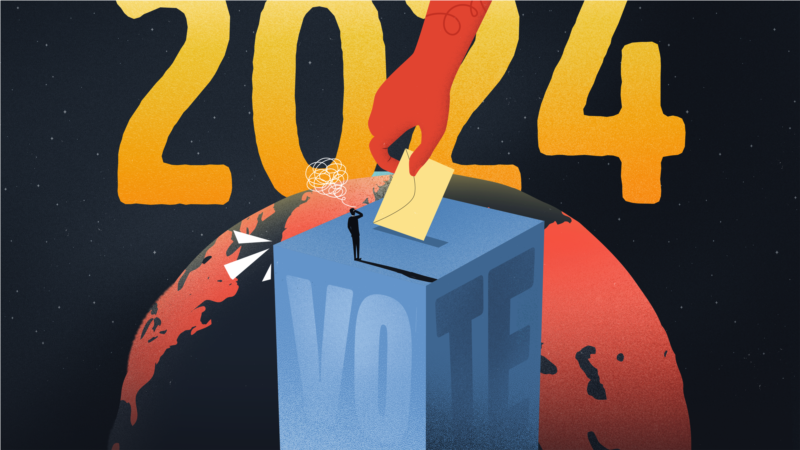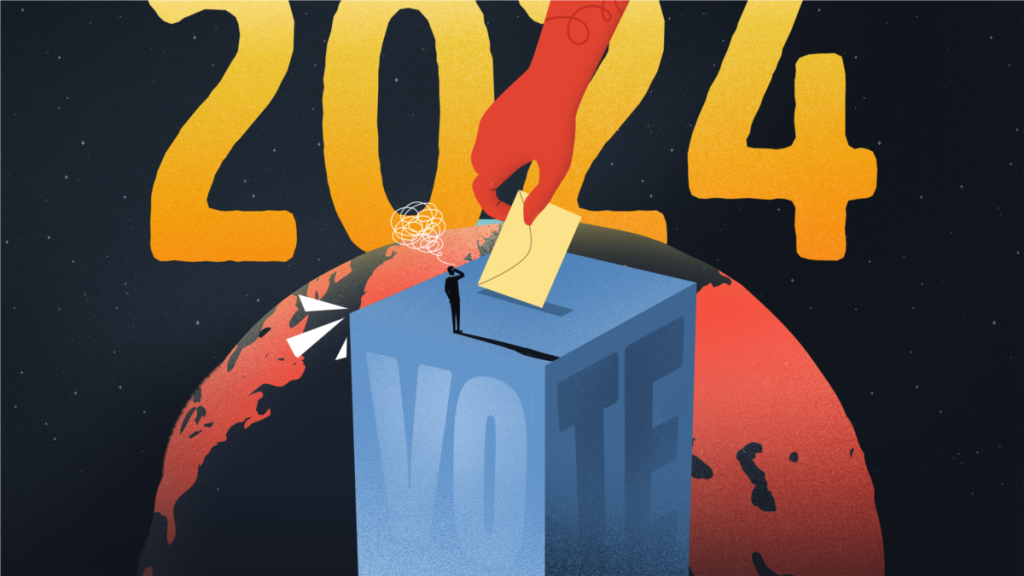
2024 was a big year for elections. More than 70 national elections were held throughout the world, affecting more than half of the world’s population.
Among the countries holding elections were some of the world’s biggest democracies — India, the United States, Indonesia and Bangladesh — as well as 27 European member states electing the new European Parliament.
The total number of ballots cast in 71 elections and the European Parliament elections was more than 1.6 billion, according to the International Institute for Democracy and Electoral Assistance, or International IDEA.
Voting against the status quo
Elections across the globe in 2024 were generally bad for those holding power.
Every incumbent party facing national elections in a developed country in 2024 declined in its vote share, according to a November article in the Financial Times, citing the ParlGov (parliaments and governments database) project, affiliated with multiple universities in Europe.
It was the first time this has happened in almost 120 years of records catalogued by the project.
In both rich and poor democracies around the world, more than 80% saw the incumbent party lose seats or vote share from the last election, according to an analysis by ABC News’ 538.
The 538 analysis considered countries as democracies if their Democracy Index score was at least 5 out of 10.
The shifts against incumbents struck the political left and right.
Conservatives won victories in countries and regions that included the United States, where former President Donald Trump swept all the battleground states in a November election; in Portugal, where the center-right Democratic Alliance surged in March; and at the EU Parliament, where more far-right members won seats in June elections than ever before, bringing their total to close to a quarter of the chamber.
The left took advantage of anti-incumbent sentiment to win victories that included Britain’s July parliamentary election, in which the incumbent Conservative Party lost almost 20% of the vote from 2019, and in South Korea, where liberal opposition parties, led by the Democratic Party, took power in April’s parliamentary elections.
In several countries, incumbent parties hung on to power, but shrunk their majorities, including in India, where Narendra Modi’s Hindu nationalist Bharatiya Janata Party lost an outright majority in parliament in June, but kept power with the help of allies. Incumbent parties in Japan, South Africa and France saw similar slides in support on their way to reelection.
The trend against incumbents did not necessarily hold in less democratic countries, where governments could heavily manage elections to secure their desired outcome. In Rwanda, President Paul Kagame, who ran virtually unopposed in July, won 99% of the vote, mirroring the outcome in 2017. In Russia, President Vladimir Putin won a landslide victory in a March poll that international election observers dismissed as having no chance of being free or fair.
However, there were also some signs of anti-incumbent sentiment in less democratic countries. In Bangladesh, Prime Minister Sheikh Hasina was reelected in January in a vote boycotted by the opposition, but in a smaller margin than previously. Seven months later, she was ousted in a popular uprising.
In Iran, where Supreme Leader Ayatollah Ali Khamenei has the final say on all matters of state, voters in July elections chose Masoud Pezeshkian, the more moderate presidential candidate, to replace hardliner Ebrahim Raisi, who was killed in a helicopter crash.
Why the swings?
Analysts have focused on voters’ dissatisfaction with the global economy, including rising costs, to help explain the election losses by incumbents.
One of the few countries where the incumbent party had success was in Mexico, where Claudia Sheinbaum, selected by her predecessor, Andrés Manuel López Obrador, easily won the presidency in June. Voters there reported satisfaction with economic conditions, one of the few countries where that was the case, according to a Pew Research Center survey in June.
Other issues facing voters in 2024 included a surge in migration in some nations and the continued fallout from the pandemic era, which saw long disruptions to businesses, workplaces and schools.
Furthering the dissatisfaction, a Pew survey found that democracy itself has become less attractive to voters, representing an overall sense of frustration by voters with those in power.
The survey, which polled respondents in 24 democratic countries in February, found that while large majorities believed representative democracy is a “good” system of government, a median of 59% told pollsters they were dissatisfied with how democracy was working in their own country.
In almost all countries surveyed, a majority of respondents said elected officials did not care what people like them thought. Furthering the sense of alienation, 42% of respondents said there was no party in their country that represents their views well.
While 2025 will not be as big a year for elections as 2024, next year’s polls will determine whether the trend against incumbents continues to hold, or if new factors will shape the outcomes. The year will see elections in Argentina, Australia, Belarus, Canada, Japan, and the Philippines, among others.





